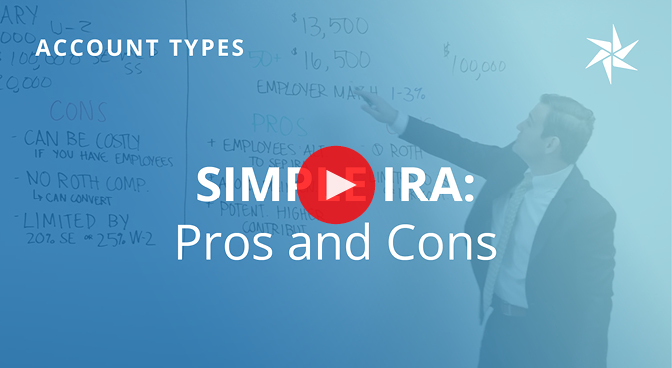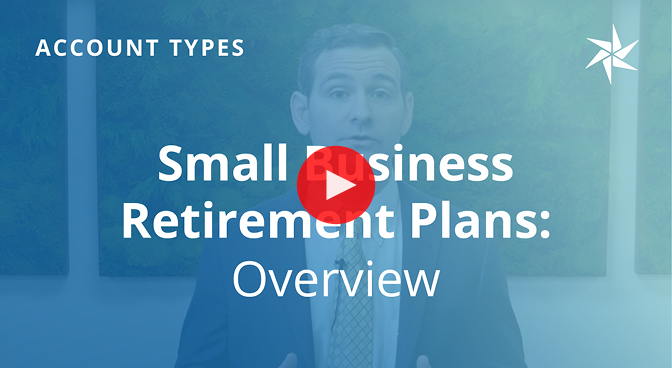What is a SIMPLE IRA?
A Savings Incentive Match Plan for Employees or SIMPLE IRA is a plan for small businesses with 100 or fewer employees who have no other qualified plans. It allows both employers and employees to contribute to retirement savings without the complexity of more intricate plans.
Employers make matching or non-elective contributions to employees’ SIMPLE IRAs, while employees can contribute pre-tax dollars. Contributions grow tax-deferred, and employees pay taxes when they withdraw the funds in retirement.
At Equity Trust, you can self-direct your SIMPLE IRA and invest in a wide range of assets, offering more control over your retirement savings strategy.
Videos


Benefits of a SIMPLE IRA
Employer match contribution: Employers are typically required to match each employee’s salary reduction contributions on a dollar-for-dollar basis, up to 3% of the employee’s annual compensation. However, employers can choose to lower the match to as little as 1% for up to two out of five years. Alternatively, employers may opt to make a non-elective contribution of 2% of compensation for each eligible employee, regardless of whether the employee makes contributions.
Employee contributions: Employees can contribute to their SIMPLE IRA through pre-tax payroll deductions, which lowers their taxable income in the current year. These contributions are easy to manage and automatically deducted from their paycheck, allowing employees to build their retirement savings consistently over time. The ability to make regular contributions encourages disciplined saving while benefiting from tax-deferred growth.
Lower administrative burden: SIMPLE IRAs are designed to be easy to set up and maintain, especially for small businesses. Compared to more complex retirement plans like 401(k)s, SIMPLE IRAs involve fewer administrative tasks and costs, making them an accessible option for small business owners who want to offer retirement benefits without the complexity.
Flexibility for small businesses: SIMPLE IRAs are a great option for small businesses with fewer than 100 employees. Employers can adjust contribution levels based on their financial situation and are not required to contribute every year. This flexibility allows small businesses to offer a retirement plan that aligns with their resources and growth.
Interested in alternative investments but don’t know where to start?
No problem. We make it easy to locate potential investments.
Available through our online account management system, myEQUITY, the WealthBridge portal provides a secure, direct connection to alternative asset investment platforms.
Discover WealthbridgeOur online marketplace introduces you to dozens of asset providers across various investment types including turnkey real estate, private equity, cryptocurrency, precious metals, and more.
Visit Investment DistrictSIMPLE IRA Contribution Limits
Each year, the IRS sets limits on how much you can contribute to a SIMPLE IRA. If you are age 50 or above, you’re eligible for a catch-up contribution of $3,500 each year. Find the current contribution limits here.
Employees’ contribution deadline falls at the end of the calendar year, while employers can contribute until the tax deadline, generally April 15 of the next year.
SIMPLE IRA Contribution Limits and Deadlines
| 2025 | 2024 | |
| Standard Contribution Limit | $16,500 | $16,000 |
| Catch-Up Contribution Limit (Age 50 and Older) | $20,000 | $19,500 |
| Super Catch-Up Contribution Limit (Age 60 – 63) – Beginning in 2025 | $21,750 | N/A |
| Contribution Deadline for Employees | 12/31/2025 | 12/31/2024 |
| Contribution Deadline for Employers | 4/15/2026 | 4/15/2025 |
Employers are generally required to match each employee’s salary reduction contributions, on a dollar-for-dollar basis, up to 3% of the employee’s compensation.
| 2024 | |
| Standard Contribution Limit | $16,000 |
| Catch-Up Contribution Limit (Age 50 and Older) | $19,500 |
| Contribution Deadline for Employees | 12/31/2024 |
| Contribution Deadline for Employers | 4/15/2025 |
Employers are generally required to match each employee’s salary reduction contributions, on a dollar-for-dollar basis, up to 3% of the employee’s compensation.
SIMPLE IRA Eligibility Requirements
To establish a SIMPLE IRA, you must be a small business owner or self-employed individual with 100 or fewer employees. Any employer – whether a corporation, partnership, or sole proprietor – can set up the plan if they meet the eligibility requirements.
Employers cannot establish a SIMPLE IRA plan if they maintain another qualified plan like a 401(k) or SEP IRA, unless the plan is for collective bargaining employees.
Employers can set less restrictive requirements than those set by the IRS for participation, but they cannot impose stricter ones. If they choose not to set requirements, employees must meet the following criteria to be eligible for the plan:
- Have earned at least $5,000 in compensation during any two preceding years
- Are expected to earn at least $5,000 in the current calendar year
Spouses and family members can also participate in the SIMPLE IRA, provided they are employees of the business and meet the income thresholds.
SIMPLE IRA Account Rules
No rollover for two years: For the first two years after opening a SIMPLE IRA, account holders are prohibited from rolling over funds into another retirement account, such as a Traditional IRA or 401(k). During this time, any withdrawals or transfers to another account will be treated as taxable distributions and may be subject to an early withdrawal penalty of 25%.
No contributions after withdrawal: Once funds are withdrawn from a SIMPLE IRA, the employee is prohibited from making further contributions to that account for the remainder of the tax year. This rule helps maintain the integrity of the retirement account and ensures that it is used for long-term savings rather than frequent withdrawals and contributions.
Required minimum distributions: Like other tax-deferred retirement accounts, SIMPLE IRAs are subject to required minimum distributions (RMDs) once the account holder reaches age 73. Failure to take RMDs each year can result in significant penalties.
SIMPLE IRA and Taxes
Contributions to a SIMPLE IRA offer immediate tax benefits, as they are made with pre-tax income. These contributions may also provide a tax deduction in the year they are made, helping to reduce taxable income.
Once inside the account, your investments benefit from tax-deferred growth. This means that earnings such as interest, dividends, or capital gains are not taxed while they remain in the IRA. There’s no capital gains tax or federal/state income tax on the investments while they grow within the account.
When you reach 59½ and begin taking distributions, those withdrawals will be taxed as ordinary income. Before this age, early withdrawals may incur penalties, but after 59½, the withdrawals are simply included as part of your income for the year in which they are taken, allowing for years of untaxed growth.
SEP IRA vs SIMPLE IRA Comparison
For small businesses looking for retirement savings options, the SEP IRA and SIMPLE IRA are two common choices. Both plans offer distinct advantages that can benefit both employers and employees, depending on the specific needs and financial goals of the business.
The chart below breaks down some key differences between the accounts:
| SEP | SIMPLE | |
| Tax Advantages | Contributions are tax-deductible for the employer, and grow tax-deferred until withdrawal | Contributions are tax-deductible, and funds grow tax-deferred until withdrawal |
| Eligibility | Available to any employer or self-employed individual, including sole proprietors, partnerships, and corporations | Available to businesses with 100 or fewer employees who earned at least $5,000 in the previous year |
| Contribution Limits | Employer contributions up to 25% of compensation or $69,000, whichever is less | Up to $16,000 under age 50 and catch-up contribution of $3,500 over age 50 |
| Employer Contributions | Employers must contribute the same percentage of compensation for all eligible employees | Employers are required to match employee contributions dollar-for-dollar up to 3% |
| Rollover Options | Can be rolled over into another SEP IRA, Traditional IRA, or Roth IRA | Can be rolled over into another SIMPLE IRA, Traditional IRA, or Roth IRA after a 2-year waiting period |
| Qualified Expenses | Can be used for a wide range of medical expenses, including deductibles, copayments, prescriptions, and some over-the-counter medications | Covers similar medical expenses as an HSA but is less flexible with over-the-counter items |
| Who Contributes | Employers only | Employers and employees |
| Withdrawals | Withdrawals before 59½ are taxed as income and incur a 10% penalty | Withdrawals before 59½ incur a 10% penalty, and withdrawals within the first 2 years incur a 25% penalty |
| SEP | |
| Tax Advantages | Contributions are tax-deductible for the employer, and grow tax-deferred until withdrawal |
| Eligibility | Available to any employer or self-employed individual, including sole proprietors, partnerships, and corporations |
| Contribution Limits | Employer contributions up to 25% of compensation or $69,000, whichever is less |
| Employer Contributions | Employers must contribute the same percentage of compensation for all eligible employees |
| Rollover Options | Can be rolled over into another SEP IRA, Traditional IRA, or Roth IRA |
| Qualified Expenses | Can be used for a wide range of medical expenses, including deductibles, copayments, prescriptions, and some over-the-counter medications |
| Who Contributes | Employers only |
| Withdrawals | Withdrawals before 59½ are taxed as income and incur a 10% penalty |
Getting Started with a SIMPLE IRA
Here are the steps to getting started with an Equity Trust self-directed SIMPLE IRA:
Open your Equity Trust SIMPLE IRA
You can easily open your SIMPLE IRA online using our account management system myEQUITY, or receive support from one of our specialized IRA Counselors.
Fund your new account
You can fund your account via rollover, transfer, or out-of-pocket contribution.
Select your investment and direct Equity Trust to send funds
myEQUITY investment wizards walk you through submitting your investment online with our liaisons ready to assist you if you need it.
FAQs
Is a SIMPLE IRA a qualified plan?
Yes, a SIMPLE IRA is considered a qualified retirement plan under IRS rules. It offers tax benefits such as pre-tax contributions and tax-deferred growth. Other qualified plans include 401(k)s, 403(b)s, and SEP IRAs.
Is a SIMPLE IRA a defined contribution plan?
Yes, a SIMPLE IRA is a type of defined contribution plan. A defined contribution plan is a type of plan where both the employer and employee contribute to the employee’s individual account. The total value of the account is then based on these contributions and any gains or losses from the investments.
Does the SIMPLE IRA contribution limit include an employer match?
No, the contribution limit for an employee’s salary deferral does not include the employer match. The employer match is made in addition to the employee’s contribution, typically up to 3% of the employee’s compensation.
Can you have a SIMPLE IRA and a 401(k)?
You generally cannot contribute to both a SIMPLE IRA and a 401(k) in the same calendar year if you are an employer. However, as an employee, you can contribute to both if they are offered by different employers, but contribution limits for each account still apply.
What can I do with my SIMPLE IRA after leaving my job?
After leaving your job, you can keep your SIMPLE IRA with the current custodian, roll it over into another IRA, or transfer it to a new employer’s retirement plan (if allowed). Note that if it has been less than two years since you opened your SIMPLE IRA, the funds can only be rolled over to another SIMPLE IRA without facing penalties.
Are bonuses subject to SIMPLE IRA contributions?
Yes, bonuses are typically considered compensation, so they are subject to SIMPLE IRA contributions, provided the employee is participating in the plan and contributions are deducted from total compensation.
Can a new employee contribute to a SIMPLE IRA?
New employees who meet the plan’s eligibility requirements if different than IRS requirements can contribute to a SIMPLE IRA immediately. If the employer does not set less strict requirements, then the employee must earn at minimum $5,000 during the current calendar year and wait to contribute until the next calendar year due to IRS guidelines.
Is there a deadline to set up a SIMPLE IRA?
Yes, employers must set up a SIMPLE IRA by October 1 of the current year if they want to establish the plan for that year. However, if your business is established after October 1, you can still set up a SIMPLE IRA as soon as possible.







